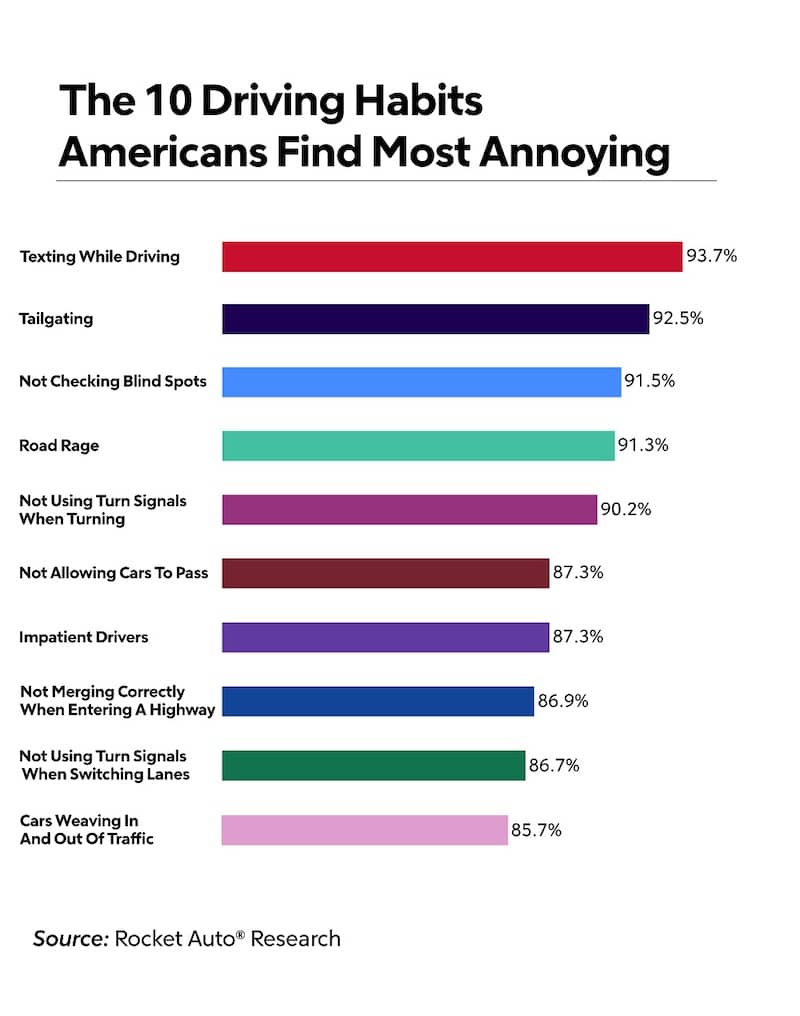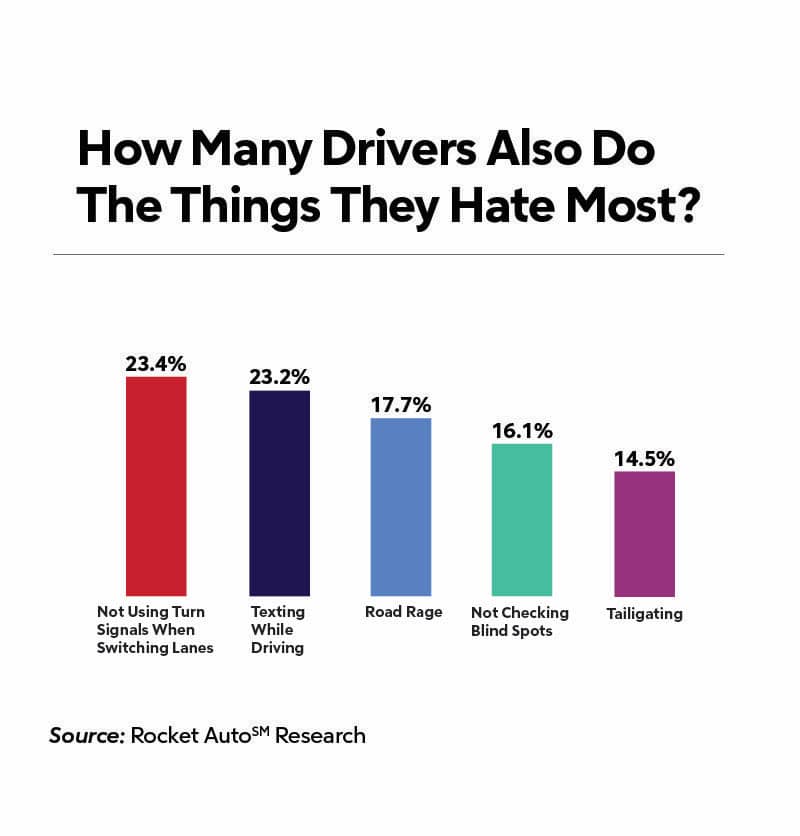
Drivers Are Guilty Of Their Most Annoying Driving Habits
David Collins4-minute read
UPDATED: December 12, 2022
American drivers are annoyed with each other. Very annoyed.
A new survey of American motorists conducted by Rocket AutoSM has found 90% or more agree on at least five driving habits of other motorists that they consider annoying. Perhaps more interesting is that a significant number of subjects revealed that they themselves have been guilty of these same transgressions.
Not surprisingly, most of the worst habits could be considered “reckless driving,” an action that puts other drivers in danger. The next category of annoying habits could be characterized as “distracted driving” that pulls drivers’ attention from the things happening around them. In fact, one particular distracting habit was determined to be the #1 most annoying of all. Survey respondents said that texting while driving is considered the most egregious sin of all, with 93.7% in agreement.
Rounding out the top 5 most annoying driving habits: tailgating (92.5%), not checking blind spots (91.5%), road rage (91.3%), and not using turn signals when changing lanes (90.2%). Taken all together, these behaviors have one thing in common – they are sometimes so annoying that they can lead to anger. Both road rage and tailgating can be seen as openly aggressive and confrontational, while not using a turn signal or checking one’s blind spot can endanger other drivers and elicit an immediate angry response.

The survey reached out to an equitable distribution of women and men (51.6% to 48.4%) among three generations – baby boomers (31.8%), Gen X (33.7%), and millennials/adult Gen Z (34.5%).
The survey also showed that regardless of how annoying drivers find some bad habits in other drivers, they admit to doing the same things themselves. In fact, 55% admit to doing at least one of the top 5 most irritating driving misdeeds.

Concerns About Speeding Do Not Correlate With Its Danger
Another issue that jumps out from the survey is drivers’ relatively cavalier attitudes toward speeding in relation to the dangers it creates on American roads. Of 18 proposed bad driving habits, 62.3% of participants ranked speeding as the 17th most egregious – next to last only to eating while driving. This despite the fact that speeding is easily among the most dangerous of bad driving habits and was a factor in 29% of all U.S. traffic fatalities in 2020, killing 11,258, or an average of over 30 people per day. Even more damning is that speeding ranked second in the survey – at nearly 55% – as the bad driving habit respondents admitted to committing most.
Men Are More Prone To Bad Habits And Impatience Than Women
When attitudes toward bad driving habits and drivers’ willingness to admit to engaging in them are contrasted by gender, some themes emerge. The larger picture is one of men who are more likely to engage in habits considered reckless, with women slightly more conscientious and safety conscious. For instance, 58% of men admit to speeding, compared to 52% of women, a significant 6-point difference. Men are more likely than women to change lanes without signaling (29% to 26%) and to resort to texting while driving (26.6% to 23.2%). Additionally, women are more likely to be frustrated by reckless driving than men (56% to 50.2%).
Taking Up Two Parking Spaces Almost Ties With Traffic Jam For Most Frustrating Driving Experience
In addition to the roadway, one place that gets Americans’ blood boiling is the parking lot. This can be for several reasons. One, parking lots – with their tight spaces and many blind spots – are the scene of a LOT of minor fender benders, scrapes, and scratches to vehicles. Second, people in parking lots get out of their cars, which can lead to confrontations. And third, the quest for a favorable parking space can be blood sport to some. Memorable episodes of two of the most successful television comedies of all time, “Seinfeld” and “Modern Family,” involved heated territorial disputes over a parking space.
But of all parking lot sins, the one that gets Americans very annoyed is when someone takes up two spaces when they park. In fact, asked to rank the top five driving experiences they liked the least, survey respondents ranked two-space parkers second-worst at 51.4%, just behind traffic jams (58%) and ahead of construction (34.8%).
Cynicism With Other Drivers Increases With Younger Generations
When answering the question which generation is more apt to be annoyed or cynical about other drivers – carefree younger drivers or cautious, set-in-their-ways older drivers – the youngest adult drivers turn out to be the most judgmental. Of adult Gen Z and millennials, the youngest group in the survey, 37.4% believe that the majority of drivers are bad. Of Generation X, the middle age range, 25.7% said the same, while only 17.3% of the older baby boom group think most drivers are bad. Younger drivers in the survey were also more than twice as ready (23.7%) to admit to road rage as baby boomers (10.1%).
Are younger drivers more busy and too impatient? Are older drivers ponderously slow and yet more forgiving? There are plenty of conclusions to make. What is safe to say, however, is that American roads continue to be a place of simmering hostilities.
Methodology
To understand the driving habits Americans find most annoying, Rocket Auto surveyed 2,019 drivers. The sample was split between men and women with 49% men and 51% women. To see how driving habits changed with each generation, one-third of the respondents were Gen Z and millennials, one-third were Gen X, and one-third were baby boomers. The survey was conducted online from May 22 – May 26, 2022.
Table of Contents
David Collins
David Collins is a staff writer for Rocket Auto, Rocket Solar, and Rocket Homes. He has experience in communications for the automotive industry, reference publishing, and food and wine. He has a degree in English from the University of Michigan.
Related Resources
Viewing 1 - 3 of 3